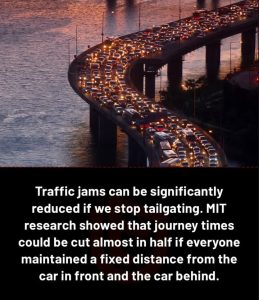
In a study, MIT experts show that by not tailgating, we could bring and end to traffic jams.
They propose a method called “bilateral control”, where drivers maintain equal distance between the car in front and the car behind, as a solution.
According to MIT professor Berthold Horn and postdoctoral associate Liang Wang, this approach could dramatically reduce congestion, potentially doubling travel speeds without the need for new roads or infrastructure upgrades.
Inspired by how flocks of birds move in unison, bilateral control relies on cars being aware of their surroundings, both forward and backward. Current adaptive cruise-control systems only focus on what’s ahead, but Horn suggests that car manufacturers add rear-facing sensors to enable this balanced driving.
Even a small number of vehicles adopting this behavior could make traffic noticeably smoother. Unlike complex “platooning” solutions that require networked vehicles, this method is simpler: it only needs software updates and affordable hardware changes.
The team’s findings, published in IEEE Transactions on Intelligent Transportation Systems, show that traffic jams caused by sudden speed changes, or “perturbations,” could dissipate rather than amplify, improving both travel times and fuel efficiency.
Peoplesmind
